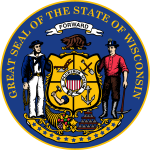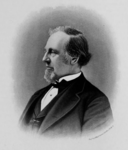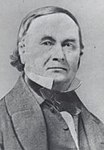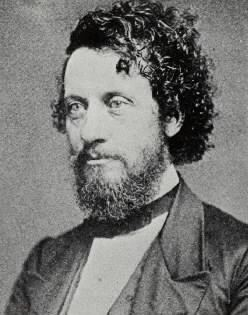
Arthur MacArthur Sr. was a Scottish immigrant to America, lawyer, and judge. He was the fourth Governor of Wisconsin and was an associate justice of the Supreme Court of the District of Columbia. He was the father of General Arthur MacArthur Jr., and paternal grandfather of General Douglas MacArthur. MacArthur is the modern spelling used by his descendants, but in documents from his own time his name was spelled McArthur.

William Augustus Barstow was an American businessman, politician, and public administrator. He was the third governor and second Secretary of State of Wisconsin, and served as a Union Army officer during the American Civil War. Before Wisconsin became a state, he was instrumental in the creation of Waukesha County.
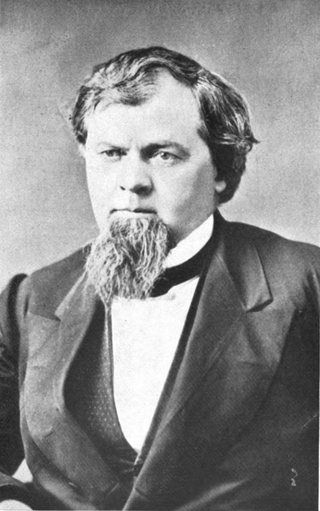
George Baldwin Smith was an American lawyer and Democratic politician. He was the 4th Attorney General of Wisconsin, and the 3rd and 16th mayor of Madison, Wisconsin.

The 2012 United States presidential election in Wisconsin took place on November 6, 2012, as part of the 2012 United States presidential election in which all 50 states plus the District of Columbia participated. Wisconsin voters chose 10 electors to represent them in the Electoral College via a popular vote pitting incumbent Democratic President Barack Obama and his running mate, Vice President Joe Biden, against Republican challenger and former Massachusetts Governor Mitt Romney and his running mate, Congressman Paul Ryan.

Edward Dwight Holton was an American business leader, politician, and Wisconsin pioneer. He was Milwaukee County's first elected sheriff and served one term in the Wisconsin State Assembly (1860). He was influential in the early political development of the state as a leader in Wisconsin's abolitionist and temperance movements, and as a co-founder of the Republican Party. He also had a strong influence on the economic development of the state through his involvement in the banking, railroad, and insurance businesses.

The 1892 United States presidential election in Wisconsin was held on November 8, 1892, as part of the 1892 United States presidential election. Wisconsin voters chose 12 electors to the Electoral College, who voted for president and vice president.

The 1896 United States presidential election in Wisconsin was held on November 3, 1896, as part of the 1896 United States presidential election. State voters chose 12 electors to the Electoral College, who voted for president and vice president.

The 1849 Wisconsin gubernatorial election was held on November 6, 1849. Democrat Nelson Dewey won the election with 52% of the vote, winning his second term as Governor of Wisconsin. Dewey defeated Whig Party candidate Alexander L. Collins and Free Soil Party candidate Warren Chase.

The 1855 Wisconsin gubernatorial election was held on November 6, 1855. Republican Party candidate Coles Bashford was declared the winner after a court challenge, defeating Democratic incumbent William A. Barstow.

The 2018 United States House of Representatives elections in Wisconsin were held on November 6, 2018, to elect the eight U.S. representatives from the state of Wisconsin, one from each of the state's eight congressional districts. The elections coincided with other elections to the House of Representatives, elections to the United States Senate, and various state and local elections. The Wisconsin Partisan Primary was held on August 14, 2018, with the governor, U.S. Senator, U.S. Representative, odd-numbered Wisconsin State Senate seats, and all Wisconsin Assembly seats on the ballot.

The 1920 Wisconsin gubernatorial election was held on November 2, 1920. Primary elections were held on September 7, 1920.

The 1922 Wisconsin gubernatorial election was held on November 7, 1922. Primary elections were held on September 5, 1922.

The 1857 Wisconsin gubernatorial election was held on November 3, 1857. After incumbent Governor Coles Bashford declined to seek re-election, Republican Party candidate Alexander Randall narrowly defeated Democratic candidate James B. Cross by a margin of just 118 votes.

The 1875 Wisconsin gubernatorial election was held on November 2, 1875. Republican Party candidate Harrison Ludington was elected with 50% of the vote, narrowly defeating incumbent Democratic governor William Robert Taylor.

This is a timeline of women's suffrage in Wisconsin. Women's suffrage efforts began before the Civil War. The first Wisconsin state constitutional convention in 1846 discussed both women's suffrage and African-American suffrage. In the end, a more conservative constitution was adopted by Wisconsin. In the 1850s, a German language women's rights newspaper was founded in Milwaukee and many suffragists spoke throughout the state. The first state suffrage convention was held in Janesville in 1867. The 1870s, several women's suffrage groups were founded in the state. In 1884, a women's suffrage bill, allowing women to vote for school-related issues is passed. In 1886, voters approve the school-related suffrage bill in a referendum. The first year women vote, 1887, there are challenges to the law that go on until Wisconsin women are allowed to vote again for school issues in 1902 using separate ballots. In the 1900s, women's suffrage conventions continue to take place throughout the state. Women collect petitions and continue to lobby the state legislature. In 1911 Wisconsin legislature passes a bill for women's suffrage that will go out to the voters in 1912. On November 4, 1912 voters disapprove of women's suffrage. Women's suffrage efforts continue, including sponsoring a suffrage school and with the inclusion of a National Woman's Party (NWP) chapter formed in 1915. When the Nineteenth Amendment goes out to the states, Wisconsin ratifies on June 10 and turns in the ratification paperwork first, on June 13, 1919.
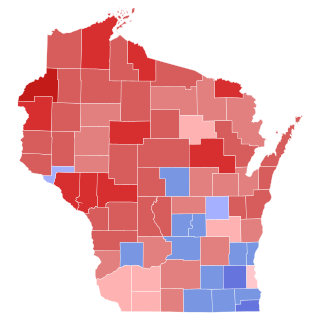
The 1924 Wisconsin gubernatorial election was held on November 4, 1924. Primary elections were held on September 2, 1924.

The 1934 Wisconsin gubernatorial election was held on November 6, 1934. Primary elections were held on September 18, 1934. Incumbent Democratic Governor Albert G. Schmedeman was defeated by Progressive nominee Philip La Follette.

The 1877 Wisconsin gubernatorial election was held on November 6, 1877. Under internal party pressure, incumbent Republican Governor Harrison Ludington, who had barely won the 1875 election, was pressured to not seek a second term. Former State Assembly Speaker William E. Smith, a longtime figure in Wisconsin politics, was selected as the Republican nominee, and Milwaukee County Municipal Judge Thomas A. Mallory won a protracted battle for the nomination at the Democratic convention. Smith and Mallory were joined in the general election by Greenback nominee Edward Phelps Allis. Ultimately, though the Republican vote share shrunk relative to 1875, the Democratic vote share shrunk more, and Smith won a larger victory than Ludington did, though only with a 44% plurality.

The 1890 Wisconsin gubernatorial election was held on November 4, 1890.

The 1894 Wisconsin gubernatorial election was held on November 6, 1894.

